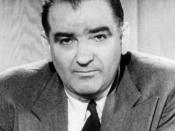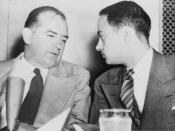During the 1950s, the American people began to develop a fear of internal communist subversion. The Korean stalemate, the "loss" in China, and the development of a Soviet atomic bomb were setbacks in the American battle against communism. Searching for people to blame, the American people were attracted to the idea of a communist conspiracy within American borders. This resulted in the era known as McCarthyism, where the frustration and fear of communism evolved into hysteria.
In February 1950, a Republican Wisconsin senator, Joseph McCarthy burst into national prominence. He made a speech claiming that he held in his hand a list of 205 known communists currently working in the American State Department. No one has ever made such a bold charge against the government before. Within weeks, he became one of the most prominent leaders in the fight against communism. He was made chairman of a special committee in charge of investigating the possibility of communism subversion.
McCarthy and his friends, Roy Cohn and David Schine, began to interrogate possible communists within the government. Soon, many politicians and critics were labeled communists. Their careers were destroyed and ended in disgrace. Some even had their passports taken away. Of the many that were accused where Charlie Chaplin, Arthur Miller, Dashiell Hammett, Waldo Salt, and Lillian Hellman. Refusing to live in such a hysterical environment, people such as Joseph Losey, Richard Wright, Ollie Harrington, James Baldwin, Herbert Biberman, Lester Cole and Chester Himes went to live and work in Europe. McCarthy also blamed the Democrats for allowing treason in the country and supported a change in parties. McCarthyism helped the Republicans to win the presidential election of 1952 with Dwight D. Eisenhower running as the Republican candidate.
Joseph McCarthy intimidated all but a few people from opposing him. His movement...


